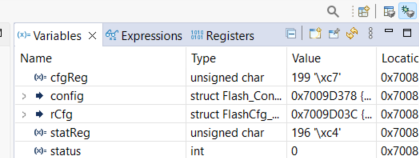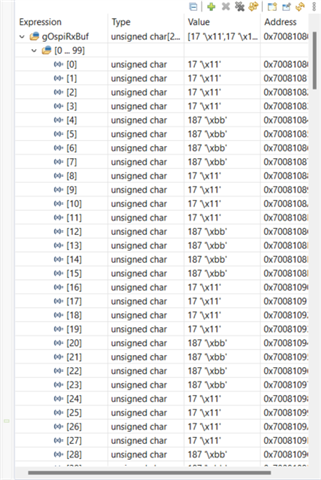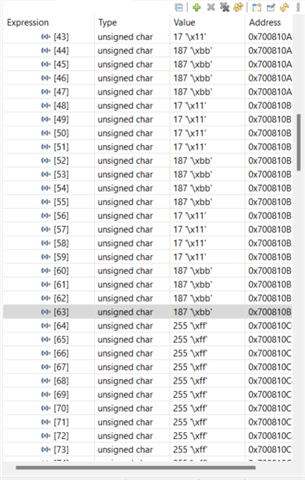Other Parts Discussed in Thread: SYSCONFIG
Hello experts,
I'm developing support for custom flash device "MX25L12833FM2I-10G".
I'm having troubles using the flash in 1S-1S-4S.
I managed to configure correctly the flash in the 1S-1S-4S protocol. After configuration the bit6 (QE, quad enable) of the status word is set correctly and the amount of dummy cycles is set to 10 (bit6/7 of configuration register), as shown in the image, where cfgReg = configuration register and statReg = status register.

The problem occurs when I execute a QREAD command (0x6B):
I'm using the ospi_flash_io example provided by the SDK, where it writes an array of values to the flash (from 0 to 255 in crescent order) and then reads back this values.
In the read buffer I'm getting this values instead:


This response from the flash makes me wonder if all the 4 spi pins (D0,D1,D2,D3) are actually being used or if I'm missing something the the peripheral configuration.
Here you can find the sysconfig file from my project
/**
* These arguments were used when this file was generated. They will be automatically applied on subsequent loads
* via the GUI or CLI. Run CLI with '--help' for additional information on how to override these arguments.
* @cliArgs --device "AM243x_ALX_beta" --package "ALX" --part "ALX" --context "r5fss0-0" --product "MCU_PLUS_SDK_AM243x@09.00.00"
* @versions {"tool":"1.18.0+3266"}
*/
/**
* Import the modules used in this configuration.
*/
const flash = scripting.addModule("/board/flash/flash", {}, false);
const flash1 = flash.addInstance();
const clock = scripting.addModule("/kernel/dpl/clock");
const debug_log = scripting.addModule("/kernel/dpl/debug_log");
const mpu_armv7 = scripting.addModule("/kernel/dpl/mpu_armv7", {}, false);
const mpu_armv71 = mpu_armv7.addInstance();
const mpu_armv72 = mpu_armv7.addInstance();
const mpu_armv73 = mpu_armv7.addInstance();
const mpu_armv74 = mpu_armv7.addInstance();
/**
* Write custom configuration values to the imported modules.
*/
flash1.$name = "CONFIG_FLASH0";
flash1.device = "CUSTOM_FLASH";
flash1.flashSize = 16777216;
flash1.flashBlockSize = 65536;
flash1.dummy_isAddrReg = false;
flash1.dummy_cfgReg = "0x00000000";
flash1.addressByteSupport = "0";
flash1.idNumBytes = 5;
flash1.modeClksRd = 0;
flash1.fourByteEnableSeq = "0x80";
flash1.flash444Seq = "0x00";
flash1.flashManfId = "0xC2";
flash1.flashDeviceId = "0x2018";
flash1.cmdBlockErase4B = "0xFF";
flash1.cmdSectorErase4B = "0xFF";
flash1.flashQeType = "2";
flash1.protocol = "1s_1s_4s";
flash1.dummy_cmdRegRd = "0x15";
flash1.dummy_cmdRegWr = "0x01";
flash1.dummy_mask = "0xC0";
flash1.dummyClksRd = 10;
flash1.dummy_shift = 6;
flash1.dummy_bitP = 3;
flash1.fname = "MX25L128";
flash1.enable4BAddr = false;
flash1.cmdRd = "0x6B";
flash1.quirks = "NULL";
flash1.peripheralDriver.$name = "CONFIG_OSPI0";
flash1.peripheralDriver.inputClkFreq = 100000000;
debug_log.enableUartLog = true;
debug_log.uartLog.$name = "CONFIG_UART_LOG";
debug_log.uartLog.UART.$assign = "USART0";
mpu_armv71.$name = "CONFIG_MPU_REGION0";
mpu_armv71.size = 31;
mpu_armv71.attributes = "Device";
mpu_armv71.accessPermissions = "Supervisor RD+WR, User RD";
mpu_armv71.allowExecute = false;
mpu_armv72.$name = "CONFIG_MPU_REGION1";
mpu_armv72.size = 15;
mpu_armv72.accessPermissions = "Supervisor RD+WR, User RD";
mpu_armv73.$name = "CONFIG_MPU_REGION2";
mpu_armv73.baseAddr = 0x41010000;
mpu_armv73.size = 15;
mpu_armv73.accessPermissions = "Supervisor RD+WR, User RD";
mpu_armv74.$name = "CONFIG_MPU_REGION3";
mpu_armv74.baseAddr = 0x70000000;
mpu_armv74.size = 21;
mpu_armv74.accessPermissions = "Supervisor RD+WR, User RD";
/**
* Pinmux solution for unlocked pins/peripherals. This ensures that minor changes to the automatic solver in a future
* version of the tool will not impact the pinmux you originally saw. These lines can be completely deleted in order to
* re-solve from scratch.
*/
flash1.peripheralDriver.OSPI.$suggestSolution = "OSPI0";
flash1.peripheralDriver.OSPI.CLK.$suggestSolution = "OSPI0_CLK";
flash1.peripheralDriver.OSPI.CSn0.$suggestSolution = "OSPI0_CSn0";
flash1.peripheralDriver.OSPI.D3.$suggestSolution = "OSPI0_D3";
flash1.peripheralDriver.OSPI.D2.$suggestSolution = "OSPI0_D2";
flash1.peripheralDriver.OSPI.D1.$suggestSolution = "OSPI0_D1";
flash1.peripheralDriver.OSPI.D0.$suggestSolution = "OSPI0_D0";
debug_log.uartLog.UART.RXD.$suggestSolution = "UART0_RXD";
debug_log.uartLog.UART.TXD.$suggestSolution = "UART0_TXD";
Thank you in advance,
Best Regards,
Andrea F,



